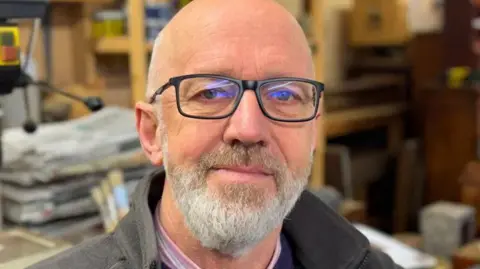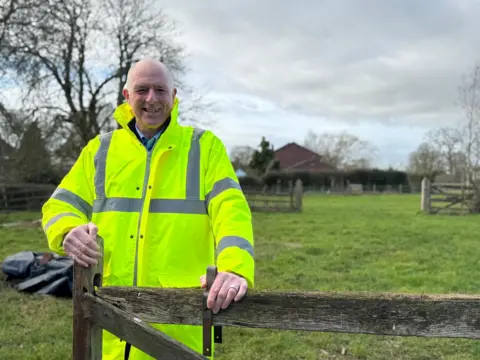'We can't deliver 130% rise in housing targets' - council leader
 BBC
BBCA Lincolnshire council leader has described new housing targets as "unrealistic".
East Lindsey District Council leader Craig Leyland is "challenging" the government after being told the area must see a 130% rise in the number of new homes every year.
He says the ambition to build more "must be rational".
The Ministry of Housing, Communities & Local Government said Lincolnshire has to "play its part" in building more homes.
The government has pledged to see 1.5 million new homes built in England between now and the next General Election.
New, mandatory targets for Lincolnshire mean a total of 1,552 a year - a rise of 52 percent on previous targets under the Conservative government.
Within that figure, each district has been given its own target and in East Lindsey it jumps from 437 to 912 homes per year.
Councillor Leyland said that the council is "seeking to understand where the figures have been arrived at".
He says the council is "granting enough planning permissions" which are not always acted upon by developers.
The challenges of building by the coast, because of flood risk, and the Lincolnshire Wolds, a designated Area of Outstanding Natural Beauty, make the targets even more unachievable, he claims.
"That forces the development into our market towns and small communities which are already struggling," he said.

Evie Capps, aged 20, from Horncastle in East Lindsey, is living with her parents, and works full-time in a cafe.
"In order to buy a house, I would have to have £10,000 saved and I would have to earn at least three times more than I do now," she said.
"There should be more houses, not overcrowding. It would be better for the community."

As well as setting the new targets, the government has also promised to overhaul the planning system.
Lincolnshire developer Steve Gelder, founder of the Gelder Group, is sceptical about the targets currently being met "because we don't have the skilled workforce and the planning system gets in the way".
Housing is a key issue in next month's Greater Lincolnshire Mayoral elections.
Conservative candidate Rob Waltham said the targets are "undeliverable" because "the sites to build them haven't been allocated and to do that you'd have to go through a whole new process with local plans".
Dame Andrea Jenkyns, who is standing for Reform UK, said "we need to build more homes but need to ensure local people have a true voice and are properly consulted".
Trevor Young, the Liberal Democrat candidate, said the targets are "unrealistic": "It's okay for the government to come up with idealistic targets but where are the jobs and money coming from?"
Marianne Overton from the Lincolnshire Independents said she "has fought hard against the imposition of over-ambitious targets which are very hard to meet".
Sally Horscroft of the Green Party said "we would do our best to deliver but it has to be the right housing in the right places".
Jason Stockwood, Labour candidate, has been approached for comment.
In a statement, the Ministry of Housing, Communities & Local Government said the targets are "vital given we have inherited the worst housing crisis in living memory".
"Alongside this, we have taken decisive action to build up essential skills in the construction industry, including training up to 60,000 more engineers, bricklayers, electricians, and joiners by 2029 to tackle skills shortages," it said.
You can see more on this story on Politics North at 10:00 GMT on BBC One on Sunday or on BBC iPlayer.
Listen to highlights from Lincolnshire on BBC Sounds, watch the latest episode of Look North or tell us about a story you think we should be covering here, external.
